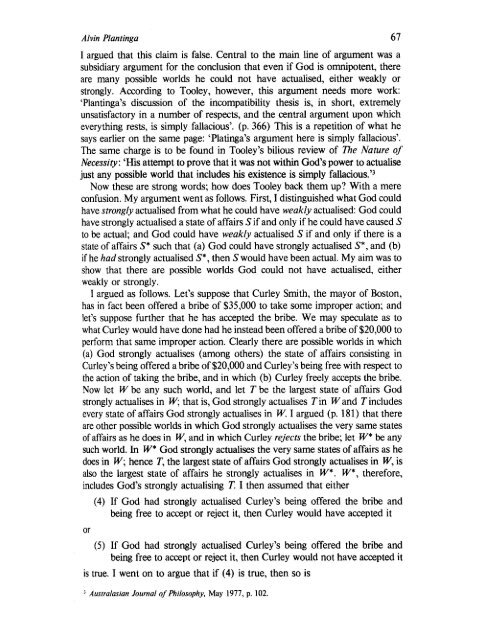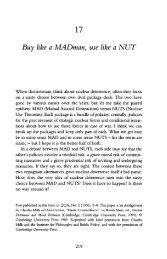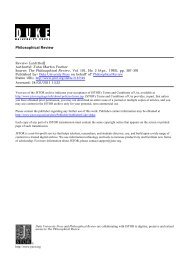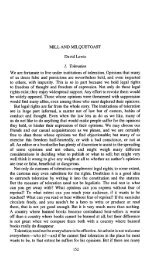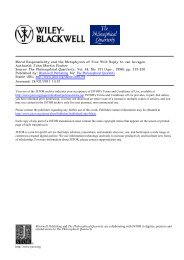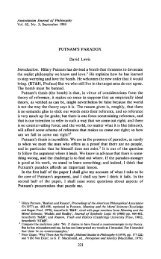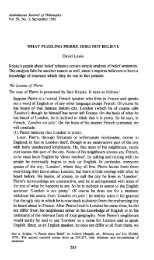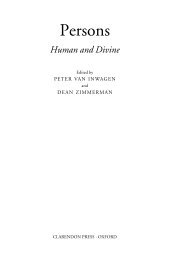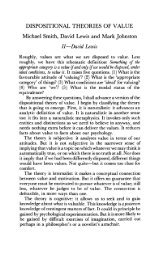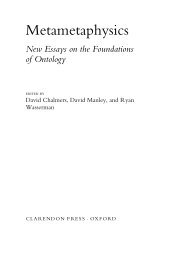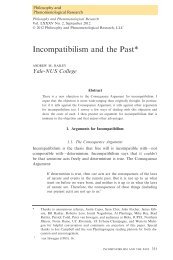Tooley and Evil - Andrew M. Bailey
Tooley and Evil - Andrew M. Bailey
Tooley and Evil - Andrew M. Bailey
- No tags were found...
Create successful ePaper yourself
Turn your PDF publications into a flip-book with our unique Google optimized e-Paper software.
Downloaded by [University of Notre Dame] at 11:51 14 April 2012Alvin Plantinga 67I argued that this claim is false. Central to the main line of argument was asubsidiary argument for the conclusion that even if God is omnipotent, thereare many possible worlds he could not have actualised, either weakly orstrongly. According to <strong>Tooley</strong>, however, this argument needs more work:'Plantinga's discussion of the incompatibility thesis is, in short, extremelyunsatisfactory in a number of respects, <strong>and</strong> the central argument upon whicheverything rests, is simply fallacious'. (p. 366) This is a repetition of what hesays earlier on the same page: 'Platinga's argument here is simply fallacious'.The same charge is to be found in <strong>Tooley</strong>'s bilious review of The Nature ofNecessity: 'His attempt to prove that it was not within God'spower to actualisejust any possible world that includes his existence is simply fallacious. '3Now these are strong words; how does <strong>Tooley</strong> back them up? With a mereconfusion. My argument went as follows. First, I distinguished what God couldhave strongly actualised from what he could have weakly actualised: God couldhave strongly actualised a state of affairs S if <strong>and</strong> only if he could have caused Sto be actual; <strong>and</strong> God could have weakly actualised S if <strong>and</strong> only if there is astate of affairs S* such that (a) God could have strongly actualised S*, <strong>and</strong> (b)if he had strongly actualised S*, then S would have been actual. My aim was toshow that there are possible worlds God could not have actualised, eitherweakly or strongly.I argued as follows. Let's suppose that Curley Smith, the mayor of Boston,has in fact been offered a bribe of $35,000 to take some improper action; <strong>and</strong>let's suppose further that he has accepted the bribe. We may speculate as towhat Curley would have done had he instead been offered a bribe of $20,000 toperform that same improper action. Clearly there are possible worlds in which(a) God strongly actualises (among others) the state of affairs consisting inCurley's being offered a bribe of $20,000 <strong>and</strong> Curley's being free with respect tothe action of taking the bribe, <strong>and</strong> in which (b) Curley freely accepts the bribe.Now let W be any such world, <strong>and</strong> let T be the largest state of affairs Godstrongly actualises in W; that is, God strongly actualises Tin W<strong>and</strong> Tincludesevery state of affairs God strongly actualises in W. I argued (p. 181) that thereare other possible worlds in which God strongly actualises the very same statesof affairs as he does in W, <strong>and</strong> in which Curley rejects the bribe; let W* be anysuch world. In W* God strongly actualises the very same states of affairs as hedoes in W; hence T, the largest state of affairs God strongly actualises in I41, isalso the largest state of affairs he strongly actualises in W*. W*, therefore,includes God's strongly actualising T. I then assumed that eitheror(4) If God had strongly actualised Curley's being offered the bribe <strong>and</strong>being free to accept or reject it, then Curley would have accepted it(5) If God had strongly actualised Curley's being offered the bribe <strong>and</strong>being free to accept or reject it, then Curley would not have accepted itis true. I went on to argue that if (4) is true, then so is3 Australasian Journal of Philosophy, May 1977, p. 102.


